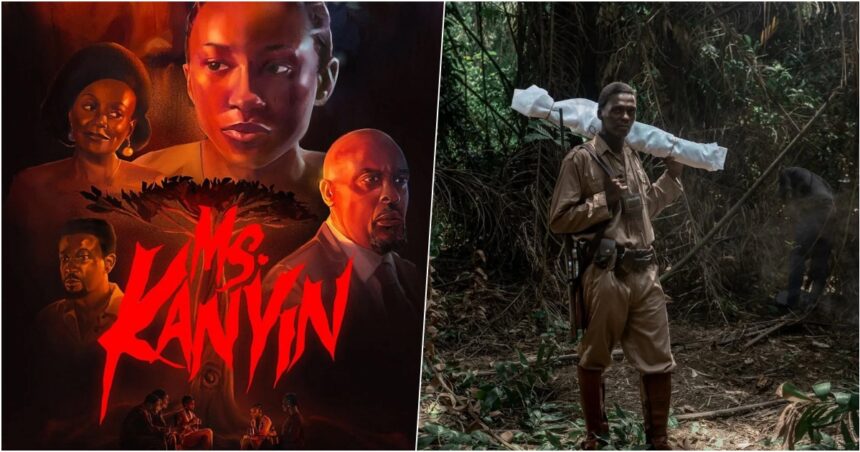“Ms. Kanyin” doesn’t claim to be based on the Nigerian urban legend of “Madam Koi Koi”—a vengeful spirit that haunts the hallways and toilets of school dormitories— it’s easy to draw comparisons between this movie and the myth for various reasons.
Nigerian filmmakers continue to be fascinated and inspired by this legend, leading them to make movies partially based on this urban legend: “Koi Koi” (2022, a short story) by Olumense Omonjahio and “The Origin: Madam Koi-Koi” (2023) by Jay Franklyn Jituboh. Each director has attempted to reimagine the narrative and the best way to convey it, even if its genesis is still unclear.
“The Origin: Madam Koi-Koi” (2023) was, according to some critics, voyeuristic and exploitative of the female body because it depicted female characters being raped repeatedly. I think that by doing this, the screenwriters, Jay Franklyn Jituboh and Boladale Falola, hoped that when the perpetrators get the punishment they deserve, it would be commensurate with the cathartic feeling of the audience. But when the time came, the punishment was too fleeting for the explicit and blatant sexual violence the audience had endured.
Ms. Kanyin instead doesn’t subject us to such explicit scenes, but when the film opens, we’re all the same spectators exposed to the theatricality of horror and gore—the flying head of a colonizer, the dismemberment of his slaves, and the scream of terror when they come across an evil tree called the Tree of Life (perhaps it would have been better to call it the Tree of Death). Calling such a tree the Tree of Life seems contradictory, doesn’t it? But there’s little to no moral quandary in seeing the decapitation of a coloniser. Furthermore, the terror we witness is theatrical in nature since it is easy to see that the hands, limbs, heads, and other body parts are prosthetics, which lessens the gore.
It’s the late 90s in Sterling Academy, where Amara (Temi Otedola) finds out that her French teacher, Ms. Kanyin (Michelle Dede), scored her a C in a mock exam, which could jeopardise her getting admitted into Harvard come WAEC if she doesn’t get an A. But when she receives a conditional acceptance letter from her dream school, she’s ready to do anything to get an A. First, she suggests that Ms Kanyin give her the French exam paper for the upcoming national exam, but Ms. Kanyin refuses. So Amara and her friends, Lami (Damilola Bolarinde), Finditae (Kanaga Eme Jrn.), Fiona (Aduke Shittabey), and Uti (Natse Jemide), connive to break into Ms Kanyin’s chalet and steal the examination papers with the help of her old friend too, Chisom (Toluwani George).
An hour into the movie, we’re only treated to petty squabbles and quarrels amongst the teachers and the students. The movie is bogged down by its soap-operatic plot that fails to immediately incite us and grab our attention. And after the hour mark, we only watch it, but passively. But even for a soap opera, “Ms. Kanyin” could be a tad tedious, with the relationship between the characters looking and feeling like an encumbrance that the movie would like to get out of the way because of how rote they are.
The romantic subplot between Ms. Kanyin and Mustafa in the movie is adorable. Like adults falling in love for the first time, the two characters have a charmingly naïve chemistry. However, the characters of the movie are underdeveloped because even this subplot doesn’t tell us anything about them, particularly the titular character, who once dreamed about traveling to France and living in Paris but instead ended up teaching in a school. Only via Amara do we know that that dream got dashed.
“Ms. Kanyin” fails to evoke any form of genuine fear. The jump scares are basic and ineffective at eliciting any kind of shock or fright. The deaths follow the same pattern—slitted throats—but under different circumstances for the victims, and in the victims’ deaths, there’s no looming sense of impending horror to come. The film is a terrible dreck, and for a film that poses as a horror film, the fear is essentially nonexistent.
“Ms. Kanyin” could have done with a tighter script written by Tobe Atuogbedor and Ayoyemi Adeyemi. What we have instead is a loose script that. One hour into the movie, I was still asking myself if the movie was ever going to start, or if it had already.
The movie is equally bogged down by the lack of a sterling performance from any of the actors involved. Temi Otedola, in a role reminiscent of her role in Kunle Afolayan’s “Citation,” lacks the charm to lead a cast, but so do any of the characters in the movie. But it seems to me that Jerry Ossai couldn’t really impart his vision to any of the characters as the director.
“Ms. Kanyin” is a soap-operatic horror that failed on multiple fronts. The movie is simply another film inspired by the urban myth of Madam Koi-Koi, without anything new to really say. But its nifty-looking cinematography and ensemble of young actors could endear you to see the movie.
Rating:5/10

















I agree. Nollywood keeps exploring new forms of storytelling these days, which is impressive, but they are still not getting it right.